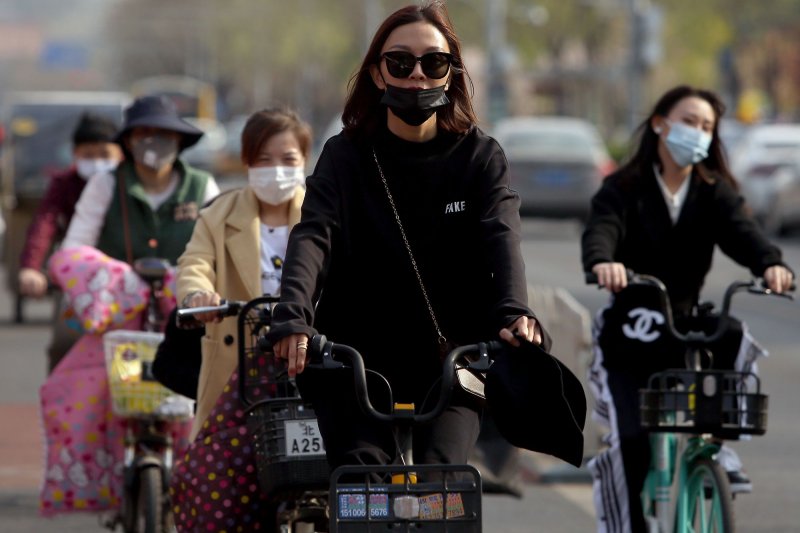Paul Sandle
LONDON (Reuters) - Captain Tom Moore, 99, a British war veteran, completed the last of 100 laps of his garden on Thursday, raising more than 15.4 million pounds ($19 million) for the health service in a feat that has spread joy across the country amid the coronavirus gloom.
“For all those people who are finding it difficult at the moment: the sun will shine on you again and the clouds will go away,” said Moore, dressed in a blazer and tie and displaying his war medals, after completing his walk.
The retired army captain, who has used a walking frame with wheels since breaking his hip, set himself the target of walking the 25 metres around his garden 100 times before his 100th birthday on April 30.
He completed his challenge to praise from around the country and beyond - and a salute from soldiers in the regiment which replaced his own. “I feel fine,” he said.
Raised in Yorkshire, northern England, Moore served in India, Burma and Sumatra during World War Two.
He said the walk was inspired by the care he received from Britain’s state-run National Health Service when he broke his hip and when he was treated for cancer.
His original target was 1,000 pounds.
But that modest aim was blown away as media attention from around the globe zoomed in on his garden in Bedfordshire, central England.

Veteran Capt Tom Moore talks to soldiers from 1st Battalion The Yorkshire Regiment who formed a Guard of Honour for the veteran as he completed his fundraising walk for the health services, in Bedfordshire, Britain, April 16, 2020. Ministry of Defence/Crown Copyright 2020/Handout via REUTERS
The retired army captain, who has used a walking frame with wheels since breaking his hip, set himself the target of walking the 25 metres around his garden 100 times before his 100th birthday on April 30.
He completed his challenge to praise from around the country and beyond - and a salute from soldiers in the regiment which replaced his own. “I feel fine,” he said.
Raised in Yorkshire, northern England, Moore served in India, Burma and Sumatra during World War Two.
He said the walk was inspired by the care he received from Britain’s state-run National Health Service when he broke his hip and when he was treated for cancer.
His original target was 1,000 pounds.
But that modest aim was blown away as media attention from around the globe zoomed in on his garden in Bedfordshire, central England.
Veteran Capt Tom Moore talks to soldiers from 1st Battalion The Yorkshire Regiment who formed a Guard of Honour for the veteran as he completed his fundraising walk for the health services, in Bedfordshire, Britain, April 16, 2020. Ministry of Defence/Crown Copyright 2020/Handout via REUTERS
The story lifted the hearts of a nation in lockdown, weary of relentless waves of grim news.
It has also embodied an outpouring of gratitude for Britain’s doctors, nurses and other healthcare workers on the front line in the fight against the pandemic.
So far, nearly 13,000 people with COVID-19 have died in British hospitals, the fifth-highest total globally. Twenty-seven were health workers, Health Minister Matt Hancock said.
Moore’s achievement was a “shaft of light” in the darkness of the COVID-19 crisis, he said. “Captain Tom, what an inspiration to us all.”
FANTASTIC
Moore said the amount raised from more than 750,000 supporters was an “absolutely fantastic sum of money”.
“It’s unbelievable that people would be so kind to give that sort of money to the National Health Service,” he said.
Moore received a guard of honour from soldiers from the First Battalion of the Yorkshire Regiment, the successor to his Duke of Wellington’s regiment, as he completed his final lap.
Afterwards he received messages of congratulation from figures from sport, politics and entertainment.
Ben Stokes, England’s leading cricketer, said he hoped he would be moving as well as Moore when he was 50 let alone 100, while finance minister Rishi Sunak praised his “Yorkshire grit”.
Prime Minister Boris Johnson, who is recovering after being treated in intensive care with COVID-19, would look at ways to recognise Moore, his office said.
“Tom has captured the heart of the nation with his heroic efforts and has raised an incredible amount of money for hard working NHS staff,” Johnson’s official spokesman said.
A petition for Moore to receive a knighthood had received more than 20,000 signatures on Thursday, and he was even in the running to be voted British “Sports Personality of the Year”, an honour that went to Stokes, who is 28, in 2019.
Moore remained focused on the sacrifices made by health service workers and the efforts of his fellow Britons, who have been locked down since March 23.
“You’ve all got to remember that we will get through it in the end, it will all be right, it might take time,” Moore said. “At the end of the day we shall all be ok again.”
Moore’s family said they had fielded interest from as far afield as the United States, France and Australia.
Son-in-law Colin Ingram said raising money for the health service had given Moore a new lease of life.
“He’s coming down in the morning sprightly and loving it,” Ingram told Reuters on Wednesday.
The money raised will go to NHS Charities Together, an organisation that represents 140 member charities that support the work of the health service, according to his donation page on the JustGiving website.
Additional reporting by Kate Holton and Elizabeth Piper, Editing by Guy Faulconbridge and Janet Lawrence










